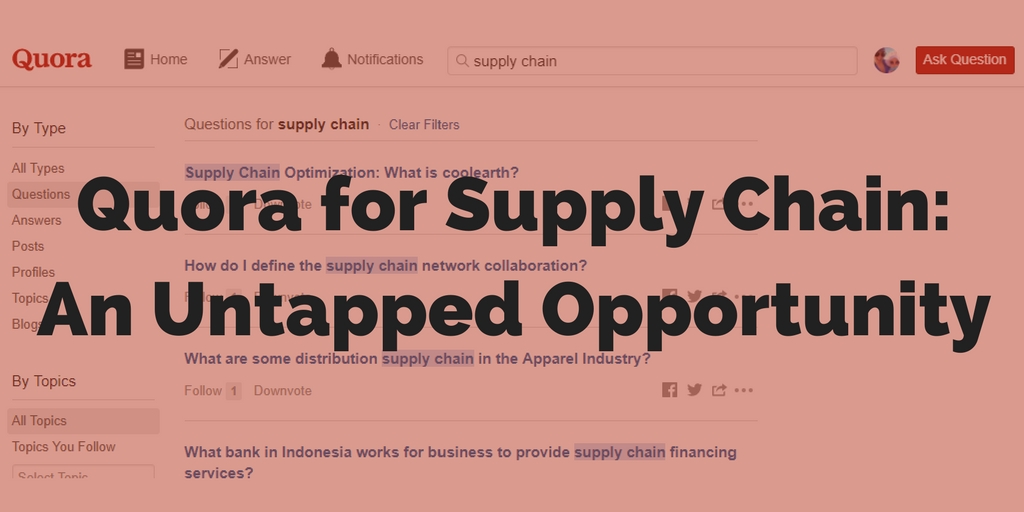
Quora for Supply Chain Part 2: How B2B Businesses Are Successfully Using Quora
Learn how a mobile advertising network and an inbound marketing agency tried Quora as a marketing tool.
Last month, I gave you some tips on how supply chain and logistics marketers can use Quora to build their brands. If you’ve forgotten why you should be incorporating Quora into your marketing strategy, here’s a quick recap:
- Research: Quora offers amazing insight into what thought leaders in the supply chain and logistics industries are focused on. Just by tuning into the conversation, you can gain extremely valuable knowledge.
- Connections: This social media platform gives you a perfect space to connect with peers in your industry and with potential buyers, as well.
- Reputation building: Quora is one of the best tools out there for reputation building. It allows you to participate in and contribute to conversations that can shape the future of your industry. Using this platform effectively gives you the opportunity to become a resource for others in your industry and for your target buyers — and there’s no better reputation builder than that.
Plenty of business are already using Quora extremely effectively, seeing ROI and more. But supply chain and logistics companies have yet to jump on this untapped opportunity. Let’s take a look at a few success stories.
2 B2B companies successfully using Quora
Kiip
This mobile advertising network has a unique business model that “redefines how brands connect with consumers.” Back in 2014, the marketing team did a series of experiments — one of which was answering questions on Quora — to figure out which growth strategies would be most beneficial for the business model. Read about Kiip’s Quora experiment here.
Kevin Fishner, Kiip’s director of growth, said that his goal in answering Quora questions was to “build our brand presence in the mobile advertising space while driving quality leads to our site.” He offers the important insight that there is a fine line between offering valuable answers and blatantly pitching your product.
“If the question directly pertained to Kiip,” Fishner says, “I’d drop a link at the bottom of my answer. If it was a more generic mobile advertising question, I’d use insights from our campaigns at Kiip and leave it at that.”
Fishner points out that answering questions thoughtfully takes a significant time investment. But in the end, this investment is worth it for your business in all kinds of ways.
As you join the Quora conversation, keep Fishner’s insights in mind. Promoting your brand isn’t always about pitching your product. Becoming a thought leader can be just beneficial, if not more so, for your brand and, ultimately, for your bottom line.
IMPACT
Impact is an inbound marketing agency based out of Connecticut. Earlier this year, IMPACT blogger Carolyn Edgecomb wrote about how the company used Quora marketing to build brand awareness. Like Fishner, she points to following core advice for using this platform: “Hustling or selling is exactly what you shouldn’t be doing on Quora. Instead, aim to spread knowledge.”
Based on IMPACT’s experience on the site, she suggest that “by regularly engaging with other members, you’re able to gain key insights from leading experts, target your audience, and even repurpose your content while answering and asking questions.”
For IMPACT, Quora was less about generating ROI and more about “increasing brand awareness and establishing thought leadership.”
Supply chain and logistics companies can take inspiration and insight from these two Quora marketing success stories. The field is largely open. Start looking for questions you can answer, become a part of the conversation, and aim to become a thought leader.
Related posts:



